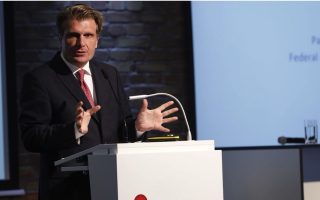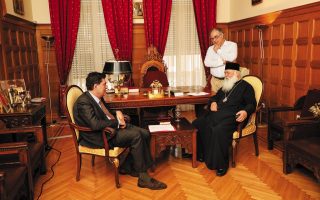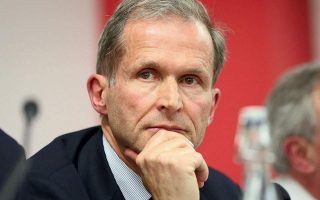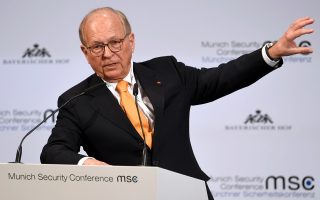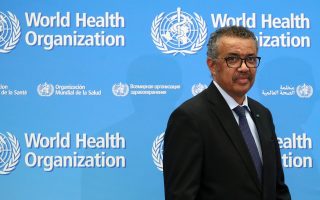Coronavirus ‘reinforces inequalities and divides,’ says Sky News’ Tim Marshall
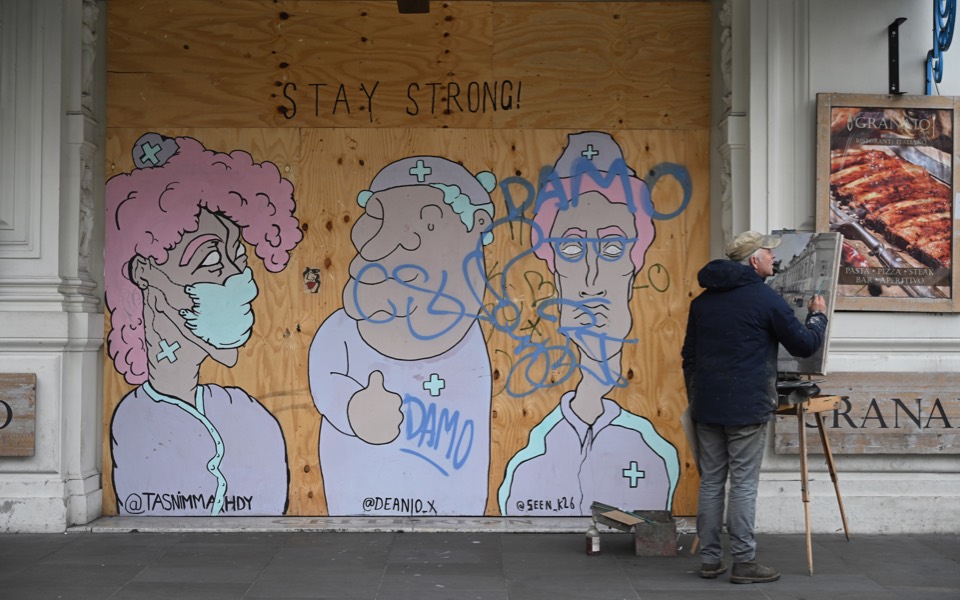
He was describing Greece, bombarding me with the word “lovely.” “Lovely country, lovely food, lovely people! And the colors on the islands are divine. I wish I could visit this summer…”
This is not a good time to travel, of course. For the time being, traveling is the stuff of dreams.
A former diplomatic editor for Sky News who is an expert on international relations, a gunpowder-scorched former journalist (served as war correspondent in more than 30 countries) and writer of several critically acclaimed books, including “Prisoners of Geography” and “Divided: Why We’re Living in an Age of Walls” (in which he analyzes some of the key factors that shape world history), the 61-year-old Tim Marshall recently spoke to Kathimerini on a wide range of subjects.
Our conversation naturally kicked off with the Covid-19 pandemic. Marshall has for the past few weeks been in lockdown in London.
How is the situation with the coronavirus crisis in the UK now?
Public support for measures taken remains high, despite a fierce media row about government mistakes. A personal view is that too many news reporters have been playing “gotcha” and have come unstuck because they don’t understand science and data. It’s clear the government has made some bad decisions, but it is not helpful when reporters use bare statistics without taking into account detail such as population density, age. There’s a weariness setting in after weeks of lockdown, as well as fear over the economy and unemployment, but also a nervousness that coming out of it too soon could be disastrous.
Geography and walls (money, race, religion, politics) are the things that divide us, as you thoroughly explain in your books. But isn’t the coronavirus now reversing these inequalities? It is a real threat to everyone on the planet.
Yes, the virus is a threat to everyone, but sadly I think it reinforces the inequalities and divides. The statistics in the UK indicate that the poor have a higher chance of dying from Covid-19. There are also examples across the world of people being discriminated against due to race and/or nationality, for example Chinese people in Europe being shouted at, black people being shunned in China and white people shunned in South Africa, all because they “brought the virus.” And at the macro level, the pandemic is exacerbating existing issues and divides. Take the Sahel states. Already wracked by conflict, poverty and drought, they are not only horribly positioned to deal with a pandemic, but will be less able to recover. This will fuel migration at a time when the richer states will have high unemployment, putting further pressure on countries to take a hard line and attempt to close their borders ever tighter.
What do you think our world will be like after the pandemic? Are you optimistic?
The world will not be fundamentally changed in the long run by this virus, although it will accelerate many existing trends. After 1919 the “Spanish flu” did not alter the trajectory of history – the Austro-Hungarian and Ottoman empires had fallen, Germany was bitter about its treatment after defeat – and what flowed from that had nothing to do with the effects of the virus. So it is now: population growth, climate change, the rise of nationalism, all these were already happening. Nevertheless, I’m optimistic about the long term. The last 400 years has seen, despite all the wars and pestilence, the steady advance of science, increased health, higher life expectancy, better education etc, and that is likely to continue as well.
Do you think that leadership and ideologies are being tested in this pandemic? If so, in what way?
Yes, every leader is challenged and will be judged on their responses to the pandemic. We won’t know for at least a year what the effect of their actions will be, but then the more reliable statistics will start to come in and we can make educated comparisons. There’ll be a blame game, especially in the democracies. The Chinese response will be studied closely. On ideology there will be discussion about whether repressive regimes are better equipped to enforce public health measures.
What about people in Britain? Do you think they will reconsider the Brexit decision after the pandemic?
There’s no evidence that attitudes have shifted. We remain divided on the subject in pretty much the same proportions as before. What has had some coverage though is the lack of solidarity within the EU. France ignored calls from the EU to lift its export ban on some drugs, all member-states responded to a global pandemic at national level. Brussels was an afterthought. The national leaders could not agree to trigger the EU’s Mechanism of Civil Protection scheme to supply PPE when Rome appealed for help at the height of Lombardy’s agony. Italy howled “betrayal,” causing Germany and a few others to step in – but again, at nation-state level. The richer northern countries then blocked EU “Coronabonds” to fund economic recovery; instead, Brussels offered cash from the European Stability Mechanism, but as Greece knows, that comes with humiliating restrictions on how it can be spent. Late April saw the EU endorse a roadmap out of lockdown, but each country had already announced their own unilateral plans. In Germany this even extended to each federal state making its own decision – shades of “Make Mecklenburg-Western Pomerania Great Again.”
What will the role of geopolitics be in tomorrow’s world?
Same as always – a reminder that geography is among the determining factors in events and proof that everything is connected.
Where did your interest in geography, politics and international relations stem from?
I first became interested in “the world” aged about 9 or 10. Over the period of about a year I remember seeing footage of Auschwitz, Martin Luther King’s funeral and the moon landings, and then I heard a recording of the BBC coverage of the D-Day landings – cumulatively they sparked a curiosity about “events” and what caused them.
What inspired you to write “Prisoners of Geography” and to produce a trilogy of “popular geography” books?
When I was covering the Bosnian War in the 1990s I quickly discovered that if you understood the geography of the situation, allied with a knowledge of history, the confusion of a multi-sided conflict became clearer. I took that lesson with me, and when stepping down from reporting I wanted to get those ideas across because I still think geography is not properly explained in some news reporting.
What spurred you to write “Divided: Why We’re Living in an Age of Walls”? Why has the number of walls increased so rapidly over the past few decades?
When I saw that a third of the world’s countries wall or fence themselves in, I knew there was a book in it. I suspect the increase in building barriers is because of a confluence of events. Nationalism had been muffled due to the horrors of the Second World War but there is a statute of limitations on the intensity of historical memory. Then the collapse of Communist repression meant the monolith of the Soviet Union was replaced by the nations who had never forgotten their histories. Following came the rise of technologies allowing all people to not only see how the rich world lives, but how to get there as well. With the financial crash of 2008/9, austerity, a decline in living standards, the arrival of increasing numbers of migrants and refugees into this mix has caused a nationalistic backlash. In the EU we see this with Brexit, the tightening of borders in places like Hungary and the refusal of many states to accept the refugee quotas which Ms Merkel told them they would take.
What was the worst crisis you had to cover as a journalist? What was the hardest story you had to report?
The answer to both questions is Syria. I’d seen how conflict divides people who thought they were united and saw it coming from the first time I went there during the war. I’d been a few times before and understood the fault lines, and when violence broke out it was no surprise that it became a civil war. In some ways that made it harder to report. I don’t have a crystal ball, I’m not an expert, but I expected the religious divides between Shia, Sunni, Christian, Druze etc to be used by the regime, the Islamists, and outside powers. I became fatalistic about the situation. It was my last war.
Of all the leaders you have interviewed, who impressed you most and why?
He’s a leader of sorts – Bill Gates. His compassion, breadth of vision and attention to detail were breathtaking. He’d be answering a question, and even as I was formulating a follow-up he’d know what the follow-up was and answer that as well.
You have said, “To those recruiting: you will take the brightest and best of the media graduates and quite right too, but please find room to look elsewhere, to people desperate to get in, to the self-educated, and to those who will give your newsroom an edge.” What are the virtues of a good journalist?
Accuracy, fairness, heart and the wisdom to know that you are prejudiced. Once you accept that your world view is not necessarily the correct one, you are more able to learn, and tell, two sides to a story.
What have you learnt from your 30 years’ experience in reporting about journalism and life?
That we are magnificent creations, “infinite in faculty,” but also animals and too easily divided by those of ill-intent.
In “Prisoners of Geography,” you wrote, “The landscape imprisons [nations’] leaders, giving them fewer choices and less room to maneuver than you might think.” What are the choices that Greek Prime Minister Kyriakos Mitsotakis has today, especially when he has to deal with Turkey’s pugnacious president, Recep Tayyip Erdogan?
They are relatively straightforward and despite being contradictory must be made simultaneously. He must always reach for compromise and good relations, whilst keeping an eye on the map of the land and sea. Greece is the front line on Erdogan’s European front, and he will use you in a wider strategy. If you can share between you the resources geography has given you, tensions can be reduced. But this geography has given you a shared border, a crowded sea, and a difficult history. Can Mitsotakis wait him out? Cracks are showing in Ankara, but I wouldn’t bet on a departure anytime soon.
With your geopolitical expertise, what are your hopes for geography, history and international relations?
That we get past this divided time as soon as possible, that we learn to share the resources we have which are enough for everyone.
